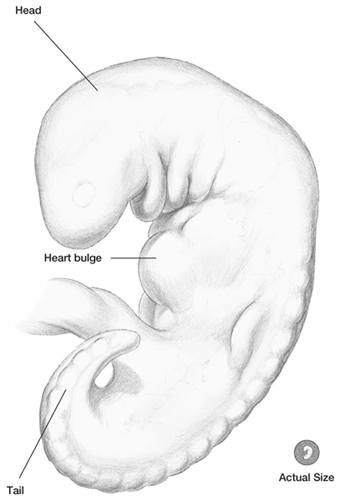2. Changes in You
Heartburn
Heartburn discomfort (pyrosis) is
one of the most common discomforts of pregnancy. Heartburn is defined as
a burning sensation in the middle of your chest; it often occurs soon
after eating. You may also experience an acid or bitter taste in your
mouth and increased pain when you bend over or lie down.
During the first trimester, nearly 25% of
all pregnant women have heartburn. It may become more severe later, when
your growing baby compresses your digestive tract.
Heartburn occurs when your digestive tract
relaxes and stomach acid creeps back into the esophagus. It occurs more
frequently during pregnancy for two reasons—food moves more slowly
through the intestines and the stomach is squeezed a bit as the uterus
gets bigger and moves up into the abdomen.
Symptoms are not severe for most women.
Eat small, frequent meals, and avoid some positions, such as bending
over or lying flat. One sure way to get heartburn is to eat a large
meal, then lie down! (This is true for anyone, not just pregnant women.)
Some antacids offer relief, including
aluminum hydroxide, magnesium trisilicate and magnesium hydroxide
(Amphojel, Gelusil, milk of magnesia, Maalox). Follow your healthcare
provider’s advice or package instructions relating to pregnancy. Don’t
take too much antacid! Avoid sodium bicarbonate because it contains a
lot of sodium, which may cause you to retain water.

Embryo at 6 weeks of pregnancy (fetal age—4 weeks).
It is growing rapidly.
Other actions you take may help with heartburn. Try some of the following, and use what works for you.
• Don’t overeat.
• Avoid foods that trigger your heartburn.
• Don’t eat late at night.
• Be careful with carbonated drinks.
• Use less fat when cooking.
• Wear loose clothing.
• Stay upright after meals, especially in late pregnancy.
• Chew gum for 30 minutes after meals and when heartburn strikes.
• Suck on hard candy.
• Get some exercise, but don’t eat for 2 hours before you begin. Use smooth moves to avoid pushing acids into your esophagus.
• Reduce stress in your life.
Another way to help relieve heartburn is
to mix the juice of ½ lemon and a pinch of salt in 8 ounces of water,
and drink it before meals. After meals, 1 teaspoon of honey may help
ease discomfort.
GERD. GERD (gastroesophageal reflux disease) or acid-reflux disease
may be mistaken for heartburn during pregnancy. It’s very common but
often overlooked. The three most common symptoms include heartburn, sour
or bitter taste, and difficulty swallowing. Other symptoms may include
persistent cough, hoarseness, upset stomach and chest pain.
Be careful with the foods you eat. Eating too much food that is spicy, highly acidic or high in fat may aggravate acid reflux.
Only your healthcare provider can
determine if you have acid reflux or GERD, so talk to him or her at a
prenatal appointment if it bothers you. He or she may prescribe a
medication that is safe to use during pregnancy. If
you are now taking prescription or over-the-counter medicines to treat
your problem, check with your healthcare provider before continuing
their use.
3. How Your Baby Is Growing and Developing
This is the embryonic period (from conception to week 10 of pregnancy, or from conception to week 8 of fetal development). During this time, the
embryo is most susceptible to things that can interfere with its
development. Most birth defects happen during this critical period.
The heart tube divides into bulges, which develop into heart chambers, called ventricles (left and right) and atria
(left atrium and right atrium). They form between weeks 6 and 7.
Occasionally, with the proper equipment, a heartbeat can be seen on
ultrasound by the 6th week. Eyes are also forming, and limb buds appear.